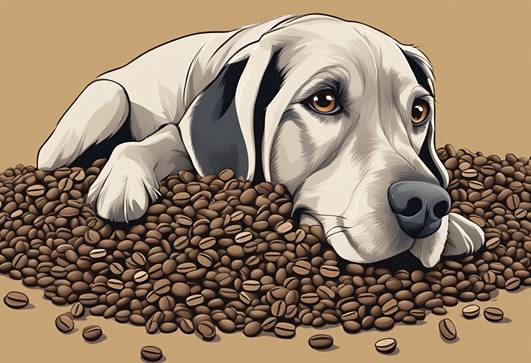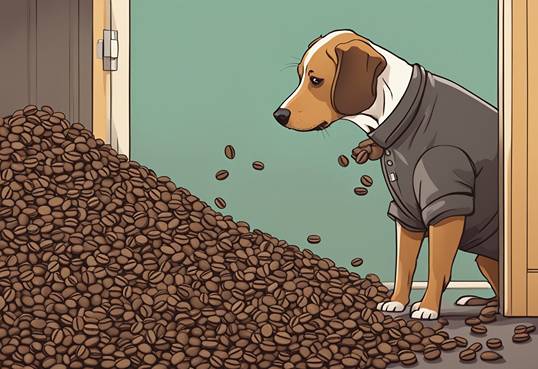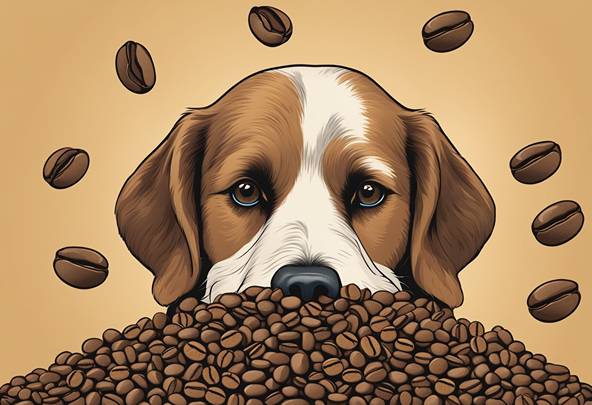As a dog owner, you might be wondering if your furry friend can safely snack on coffee beans.
While it’s natural to want to share your favorite treats with your beloved pet, it’s crucial to know what’s safe for them to consume and what’s not.
Unfortunately, coffee beans fall into the “not safe” category for dogs due to their caffeine content.
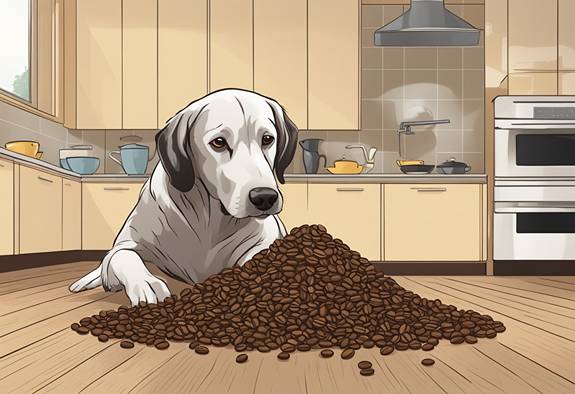
Caffeine is a stimulant that can be enjoyable and beneficial for humans, but for dogs, it can be toxic and even deadly.
Although dogs’ reactions to caffeine vary based on factors like size and individual sensitivities, ingesting coffee beans poses a significant risk to their health.
Key Takeaways
- Coffee beans are toxic to dogs due to their caffeine content.
- Canine reactions to caffeine depend on factors like size and individual sensitivities.
- If your dog ingests coffee beans, seeking immediate veterinary assistance is crucial.
Can Dogs Eat Coffee Beans?
It’s important to know that dogs should not eat coffee beans. Caffeine, a stimulant found in coffee beans, is toxic to dogs and can cause serious health issues if consumed.
Although a small ingestion might not be fatal, it’s best to keep your furry friend away from coffee beans and other caffeine-containing products.
When your dog eats coffee beans, the caffeine can cause symptoms such as tremors, elevated heart rate, restlessness, and even potentially fatal diseases.
The severity of these symptoms depends on factors such as the amount consumed, the size of your dog, and their overall health.
To better understand the risks, here are some key factors to consider:
Type of coffee beans: Both raw and roasted coffee beans are harmful to dogs. The caffeine content is present in both types, so make sure to steer clear of either when it comes to your pet.
Size of your dog: Smaller dogs will likely be affected more severely by ingesting coffee beans compared to larger dogs, simply due to their size. However, it’s crucial to avoid giving coffee beans to dogs of any size to prevent possible health issues.
The amount consumed: If your dog accidentally consumes just one or two coffee beans, it might not cause severe issues. However, larger quantities of beans can be fatal. It’s best to consult your animal specialist or call the Pet Poison Helpline immediately if you suspect your dog has ingested coffee beans.
By keeping your dog away from coffee beans and other products containing caffeine, you can ensure their safety and well-being.
Remember to always stay alert and take action if you suspect coffee bean consumption by your pet.
Understanding Canine Digestion
Caffeine’s Effects on Dogs
You might enjoy your daily cup of coffee, but it’s essential to remember that caffeine is not safe for our furry friends. When dogs ingest caffeine, it can negatively impact their central nervous system and liver functions.
In addition, caffeine can lead to a rapid heart rate, tremors, and potentially life-threatening complications in dogs.
While coffee might seem harmless to humans, the effects of caffeine on dogs can be deadly.
This is because dogs are more sensitive to caffeine than humans. So, even a small amount of coffee can cause adverse reactions in dogs.
Coffee Bean Toxicity
It’s crucial to keep your dog away from coffee beans as they contain a high level of caffeine.
Dogs should never consume coffee beans or any other products containing caffeine. Consumption can lead to serious toxicity in dogs.
Below is a brief overview of the signs of coffee bean toxicity in dogs:
- Rapid breathing
- Restlessness
- Vomiting
- Increased heart rate
- Tremors
- Seizures
If your dog accidentally ingests coffee beans, it’s essential to contact your veterinarian or an emergency pet clinic immediately.
Quick treatment can help prevent severe complications and ensure your dog’s safety.
The earlier the intervention, the better the chances are for your dog to recover fully.
In conclusion, while coffee might be a vital part of your daily routine, remember that it’s not safe for your dog, and you should keep them away from coffee and caffeine-containing products.
Potential Health Risks

Symptoms of Caffeine Poisoning
If your dog consumes coffee beans, they may be at risk of caffeine poisoning.
This toxic effect occurs due to caffeine’s stimulating properties on your dog’s nervous system.
Symptoms of caffeine poisoning include restlessness, increased heart rate, tremors, seizures, vomiting, and diarrhea.
It’s crucial to keep an eye out for these symptoms if you suspect your pet has eaten coffee beans.
Please note the following common symptoms of caffeine poisoning:
- Restlessness: Your dog may seem anxious and unable to settle down.
- Increased heart rate: This can potentially lead to more severe health issues.
- Tremors: Uncontrolled shaking of your dog’s body can be a sign of caffeine ingestion.
- Seizures: Caffeine toxicity may lead to convulsions in more severe cases.
- Vomiting and diarrhea: These symptoms may indicate upset in your dog’s digestive system.
Long-Term Health Concerns
While mild caffeine exposure might not lead to long-lasting health problems in your dog, consuming a significant amount of coffee beans can cause serious health issues, especially for smaller dogs or dogs with pre-existing conditions.
Extended exposure to caffeine can harm their nervous and cardiovascular systems, resulting in lasting side effects.
To ensure your dog’s well-being, do your best to keep coffee beans and other caffeine-containing products out of their reach.
If you suspect your dog has ingested coffee beans and shows symptoms of caffeine poisoning, don’t hesitate to contact your veterinarian for immediate advice and assistance.
Immediate Actions to Take
When to Call the Vet
If your dog has ingested coffee beans, it’s crucial to act promptly.
Signs of caffeine poisoning can appear within 30 to 60 minutes after consumption, making it essential to contact your veterinarian or the Pet Poison Helpline immediately.
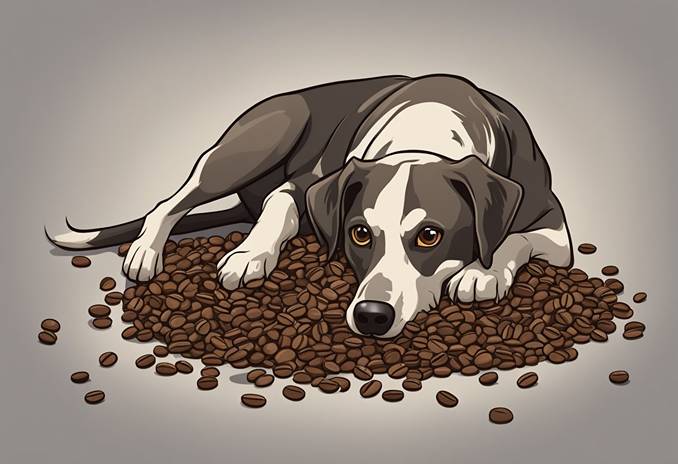
Keep in mind that severe cases might require hospitalization and intensive treatment.
It’s wise to call the vet when:
- Your dog ingested a large quantity of coffee beans.
- Your dog shows symptoms of caffeine poisoning, such as:
- Hyperactivity
- Restlessness
- Vomiting
- Rapid heart rate
- Tremors
- Seizures
First Aid for Caffeine Ingestion
While waiting for professional help, you can take some first-aid measures to minimize the harmful effects of caffeine ingestion.
Keep your dog calm. Encourage your pet to stay in a quiet and comfortable space to reduce its anxiety and stress.
Do not induce vomiting. It might seem like a logical step to take, but attempting to force your dog to vomit can actually cause more harm than good. Only do this under the supervision of a vet or the advice of a poison control professional.
Activated charcoal. A veterinarian may recommend giving your dog activated charcoal to help absorb the caffeine in their system. This can help prevent further absorption of caffeine into the bloodstream. Remember, only administer activated charcoal under your veterinarian’s guidance.
Your dog’s well-being is of utmost importance, so taking immediate action is key when it comes to caffeine ingestion.
By following these steps and prioritizing emergency care, you can help your furry friend recover from this potentially hazardous situation.
| Question | Answer |
|---|---|
| Can dogs eat coffee beans? | No, dogs should not consume coffee beans. |
| Why are coffee beans harmful? | Coffee beans contain caffeine, which is toxic to dogs. Ingesting caffeine can lead to various health issues for dogs. |
| Symptoms of caffeine toxicity | Restlessness, rapid breathing, increased heart rate, tremors, vomiting, diarrhea, and in severe cases, seizures. |
| Health risks for dogs | Caffeine can cause serious health problems, including organ failure, and can be fatal in extreme cases. |
| Safe alternatives for dogs | It’s best to avoid giving dogs any caffeinated products. Safe treats for dogs include dog-friendly snacks and fruits. |
Final Words
Coffee beans and other caffeinated products like brewed coffee, tea bags, energy drinks, and diet pills are toxic for dogs.
This toxicity is not confined to large amounts; even a single coffee bean can be dangerous, particularly for a small dog.
The level of toxicity and the ensuing caffeine poisoning in dogs depend on the dog’s size and the amount of caffeine ingested.
For pet owners, understanding the risks is crucial. If a dog consumes coffee beans or drinks coffee, it can lead to severe health issues. Symptoms of caffeine poisoning in dogs can range from mild to severe.
Mild symptoms might include restlessness or an irregular heartbeat, while severe signs could escalate to seizures or even death.
The severity often correlates with the caffeine ingested, which is why even small amounts, like a single coffee bean, can be dangerous to dogs, particularly smaller breeds.
Immediate veterinary advice is crucial in cases of caffeine poisoning.
There is no specific antidote for caffeine poisoning in dogs, so treatment typically involves managing the symptoms.
This management might include inducing vomiting to expel the caffeine from the system, administering intravenous fluids to support kidney function and hydration, and providing medications to control heart rate and seizures if necessary.
It’s important to remember that caffeine is not just in coffee; it’s also in many caffeinated beverages, diet pills, and certain foods.
If you suspect your dog has ingested coffee or another source of caffeine, contact your veterinarian immediately.
Provide as much information as possible about the type and amount of caffeine ingested.
This will help your vet determine the most appropriate course of action, which may include a trip to the veterinary clinic for further treatment.
In summary, coffee beans and caffeine are dangerous to dogs and can lead to serious health issues. If your dog ingests caffeine, it’s vital to seek veterinary advice immediately.
To prevent accidental ingestion, keep coffee beans and other sources of caffeine out of your dog’s reach.
Frequently Asked Questions
Is it toxic for dogs to eat coffee beans?
Yes, it is highly toxic for dogs any breed to eat coffee beans.
It contains caffeine which can be dangerous to dogs, causing symptoms of caffeine toxicity such as rapid heart rate, muscle tremors, restlessness and vomiting.
It’s important to keep all coffee products including coffee grounds away from your pet to prevent accidental ingestion in dogs.
What should I do if my dog eats a coffee bean?
If your dog eats a coffee bean, stay calm and call your vet immediately.
Time is of the essence as caffeine poisoning in dogs can be lethal, especially when a large dog consumes much caffeine from coffee ingestion.
Depending on the size of your dog, even small amounts of caffeine can cause serious side effects.
How much coffee is too much for dogs?
For dogs, any amount of coffee is too much. They react to caffeine much more intensely than humans do.
To draw a parallel with chocolate, where 10 teaspoons might be toxic to a 15-pound dog, it might take three teaspoons of coffee grounds to hit the toxic dose.
What is caffeine toxicity?
Caffeine toxicity refers to symptoms exhibited by dogs after ingesting products with caffeine – such as coffee beans or grounds. It causes serious symptoms that can even endanger the dog’s heart.
Signs of caffeine toxicity include rapid breathing, restlessness, muscle tremors, irregular heartbeat, and seizures.
A dog with these symptoms should be brought to a vet’s attention immediately.
What are the signs of caffeine poisoning in dogs?
Signs of caffeine poisoning in dogs can vary but often include hyperactivity, restlessness, vomiting, high heart rate, elevated blood pressure, abnormal heart rhythms, tremors, increased body temperature, and seizures.
If your dog exhibits any of these symptoms after consuming coffee, contact your vet immediately.
Can dogs drink brewed coffee?
Dogs should not drink brewed coffee. Even if the caffeine content is less than in beans, it is still dangerous to dogs.
Caffeine is a neurotoxin for dogs and any ingestion is risky.
Brewed coffee might also lead them to lick or lap up spilled coffee grounds, which is far more concentrated.
How much caffeine is in a coffee bean?
An individual coffee bean contains between 6 to 9 milligrams of caffeine on average, depending on the type and the coffee industry processing method.
This is a significant amount, especially considering that dogs are much more susceptible to caffeine than humans are.
How dangerous are coffee grounds to dogs?
Coffee grounds are extremely dangerous to dogs. They contain a concentrated amount of caffeine.
Given their accessibility and the fact that some dogs will eat just about anything, they pose a considerable risk.
Keep coffee grounds sealed away from pets at all times.
Is there an antidote for caffeine poisoning in dogs?
There is no known antidote for caffeine toxicity in dogs.
The treatment involves inducing vomiting to eliminate the caffeine from the dog’s system, providing symptomatic treatment for seizures and heart irregularities, and administering activated charcoal to absorb any remaining caffeine in the gut.
Quick and proper medical attention is required to survive a serious ingestion.
Are all coffee products harmful to dogs?
Yes, all coffee-related products can be harmful to dogs. This includes coffee beans, grounds, brewed coffee, and any food or drink that may contain coffee or caffeine.
It’s always best to keep these products out of reach of your pets to prevent accidental ingestion.


